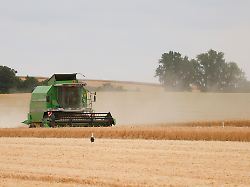“Feel Climate Change”
Farmers expect less grain – prices have fallen
7/4/2023 4:49 p.m
At the end of the harvest, less grain will be stored in farmers’ barns and silos than on average in recent years. The farmers’ association explains that the damage caused by the drought in May is too obvious. In addition, the area under cultivation decreased. Falling prices and EU regulations are causing additional hardship.
After the widespread drought in May, German farmers are expecting lower yields from the grain harvest. The German Farmers’ Association expects around 40.9 million tons in the barns. Between 2018 and 2022, an average of 42.2 million tons of grain were brought in. “Agriculture is already clearly feeling the effects of climate change,” said association leader Joachim Rukwied. The long drought in May and June “caused significant damage to the stocks.” The regional precipitation of the past few weeks came too late for grain in many places – but was helpful for sugar beets, potatoes and forage cultivation. The mood in the agricultural businesses is subdued despite the good harvest weather at the moment.
The reason for this is not only expected yield losses, but also a drop in prices for grain and rapeseed of 40 to 45 percent compared to last autumn. This situation poses great challenges for many companies in view of the increased costs. However, prices rose significantly after the Russian invasion of Ukraine. At the end of December 2022, the association had put the grain harvest at 43.1 million tons. He also stated that several factors had led to the “global price level being well above the average of recent years”.
The general reduction targets for plant protection proposed by the EU would lead to further declines in yields. The strong loss of land – an average of 55 hectares nationwide per day – due to settlement construction and infrastructure projects are also causing declining harvest volumes.
The good news, at least for consumers, is that the president of the farmers’ association does not expect any major effects on them. “We continue to assume that inflation will not be driven by agricultural products.” An exception are the prices for sugar and pork.
Organic farming is growing more slowly – revenues are falling
According to the German Farmers’ Association, winter wheat is the most important type of grain with an area of 2.8 million hectares – it fell by two percent. Winter barley grows on almost 1.3 million hectares. This is followed by spring barley with 329,000 hectares – down 11 percent – and oats with 138,400 hectares and a drop of 13 percent. The area under cultivation for winter rape has increased by around 80,000 hectares to around 1.2 million hectares this year.
Rukwied described the situation in organic farming as currently difficult. In 2022, for the first time in many years, there was a drop in sales of 3.5 percent. Consumers paid more attention to the price when shopping and bought more organic products from discounters.
According to the association, around 11.3 percent of the agricultural area is farmed organically. There are almost 31,100 organic farms in total. Rukwied expects that the market development will slow down the conversion of conventional farms to organic farming. Already in 2022 the organic area had increased by only 3.7 percent, in 2018 it was still 9.1 percent.
